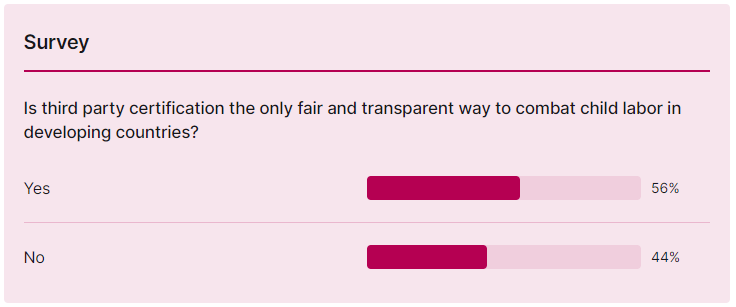The ‘Make Chocolate Fair’ campaign starts today across Europe on International Labour Organization’s ‘World Day Against Child Labour’.
It aims to raise public awareness by holding workshops and gathering signatures for a petition that will be sent to the industry in June 2015 demanding action from chocolate companies.
Viola Dannenmaier from labor group INKOTA who is coordinating the campaign, told ConfectioneryNews: “Child labor is still a very big problem in the chocolate and cocoa sector.”
Almost 820,000 children in the Ivory Coast and over 997,000 kids in Ghana were found to be working on cocoa-related activities in 2007/2008, according to Tulane University.
Poverty the root cause
“We are calling for fairer conditions on cocoa farms. In our opinion the most important point is a fair income for farmers,” said Dannenmaier.
According to the campaign, poverty is the root cause of the worst forms of child labor as low incomes force farmers to send children to work in the fields.
Third party certified cocoa from organizations such as Fairtrade, Rainforest Alliance and UTZ Certified commands a premium that ranges from $ 140 to $200 per metric ton depending on the cocoa origin country and the certifier.
A 2012 study by KPMG concluded that farmers typically received higher incomes due to these premiums. See HERE.
Third party certifiers also conduct audits on farms to stamp out reprehensible practices, including child labor.
What are the chocolate companies doing?
Major chocolate firms have adopted different approaches to combating the problem.
Mars and Hershey have committed to sourcing 100% third-party certified cocoa by 2020. Ferrero has the same aim but calls it “100% sustainable cocoa”.
Nestlé and Mondelez meanwhile plan to use some third party certification, but are not reliant on third party certifiers, having chosen to adopt their own programs –the Nestlé ‘Cocoa Plan’ and Mondelez’s ‘Cocoa Life’.
Major chocolate ingredients suppliers such as Barry Callebaut, ADM Cocoa and Cargill offer both certified and non-certified options and have their own programs – ADM Cocoa’s S.E.R.A.P, Cargill’s ‘Cocoa Promise’ and Barry Callebaut’s ‘Cocoa Horizons’.
Dannenmaier said these types of programs “were not transparent or traceable enough” and were only concerned about boosting yields to keep cocoa prices low.
ADM Cocoa: Certification does not guarantee quality
RInus Heemskerk, global director of innovation at chocolate and cocoa ingredients firm ADM Cocoa, said during a recent company visit: “Our customers and NGOs are demanding a more sustainable world. Certification is a part in that, but certification itself is not sustainability,”
“I’m more interested in how we make cocoa production and supply chain more sustainable – whether or not somebody wants that third party certified or not to me is sort of immaterial. That’s really up to the customer, whether he wants to have somebody’s certifying seal on top of his packaging to make him tell the story easier.”
He said that ADM had customers that found the S.E.R.A.P.(Socially & Environmentally Responsible Agriculture Practices) program more than enough.
“There are no cocoa quality criteria in any of the certifying programs by third parties. In our program, we have a quality component – we reward farmers for quality”
He said this was important and could help farmers achieve higher yields that would ultimately boost their income more significantly than certification premiums.
Multi-faceted approach
ADM said in a statement that it strongly condemned exploitation of underage workers. It said its S.E.R.A.P program was multi-faceted and included social responsibility and quality initiatives that went further than simply buying certified cocoa.
Heemskerk added that S.E.R.A.P was a pre certification program and farms operating under the program could go on to get third-party certification.
In other news, rhe International Cocoa Initiative (ICI) today released its 2012 Annual Report that details actions from members including ADM, Hershey, Mars and Mondelez to combat child labor. See HERE.

